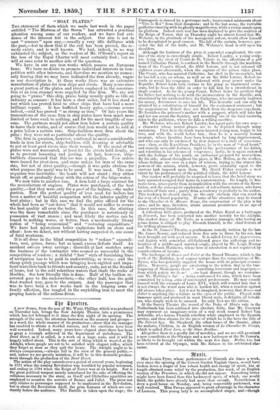" BOAT PLATES."
Tu statement of facts which we made last week in the paper entitled " The Mistress of the Storm" has attracted a practical attention among some of our readers, and we have had evi- dence of the interest felt in the subject. Our aim is not to cast " censure" upon any,—usually a very idle dalliance with the past,—but to show that if the evil has been proved, the re- medy exists, and is well known. We had, indeed, in no way exhausted the subject, as the readers of Mr. O'Dowd's report on the loss of the Royal Charter will most certainly find ; but we will at once refer to another side of the question.
We have in our eye iron works which possess an European fame. We have no desire to promote individual interests in com- petition with other interests, and therefore we mention no names ; only fearing that we may have indicated the firm already, vague as our description is. At these works there was an extensive manufacture of plates for iron ships and rivets. Many years since a great portion of the plates and rivets employed in the construc- tion of an iron steamer were supplied by this firm. We are not going to " praise " this ship, praise being usually quite as idle an industry as censure : it has been a slow sailer, but it has stood a test which has proved fatal to other ships that have had a more brilliant repute. It has buffeted heavy gales,—storms severe indeed,—and has proved " as strong as iron." Of late years the transactions of the same firm in ship plates have been much more limited or have sunk to nothing, and for the most tangible of rea- sons. The partners would not allow iron below a certain quality to leave their works, and of course that iron would not be sold at a price below a certain rate. Ship-builders were firm about the price ; they were not so particular about the quality. The firm in question, however, continued to meet a considerable
trade in iron for rivets, ship-builders still deeming it advisable to put at least good rivets into their vessels. If the metal of the plates were not warranted, at least let the rivets hold firmly, so as to prevent loosening and jarring. At last, however, ship- builders discovered that this too was a prejudice. Few orders were issued for rivet-iron, and more orders for iron of the same size, but not of rivet quality,—though it was quite obvious for what purpose the metal was to be used. It was used. The con- sequence was inevitable : the heads will not stand ; they either break off, or gradually decay with the action of the bilge-water.
We now turn to another case. A firm held a large contract for
the manufacture of engines. Plates were purchased, of the best quality,—but they were only for a part of the boilers,—the under portion. Now the perfect quality of iron used for boilers has been a matter of boastful comparison with the inferior quality of boat plates ; but in this case we find the price offered for the whole had been so "cut down " that it would not suffice to secure the best quality all over the boiler. In this case, the stinting was the more remarkable since the purchaser is notoriously in possession of vast means ; and most likely the motive can be traced to nothing worse, or better, than a mechanically literal notion of "being economical" and "reducing expenditure." We have had mysterious boiler explosions both on shore and afloat : here we detect, not without having suspected it, one cause of fatal weakness.
It is all done in the blind competition to " reduce " expendi- ture, cost, prices, fares ; but as usual, excess defeats itself. An accident sweeps away savings ; discredit at last snatches away the business of the contractor who seemed so successful in the competition of tenders ; a riskful " fast" style of furnishing lines of navigation has to be paid in underwriting, or worse ; and the cheap quick passage which was bringing keen-sighted and impa- tient travellers back to friends and country, ends, not at the fireside of home, but in the cold relentless waters that chafe the rooks of Moelfra. See how literally this is done. Half of the bullion re- covered goes to the underwriters,—the other half, less the gold dust washed way, goes to the owners. And the passenger that was to have been a few weeks back in the longing arms of family affection, lies tangled in the unyielding iron to meet the groping hands of the callous diver.


































 Previous page
Previous page